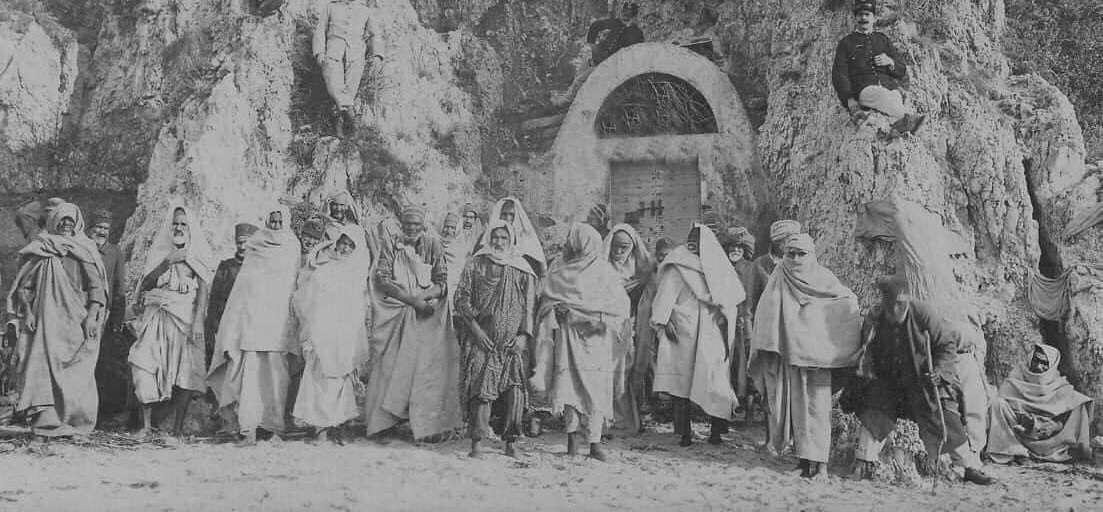One of the ugliest chapters of the Italian colonization of Libya: Today is the 114th anniversary of the mass exile of thousands of Libyans.
Pulbished on:
Tripoli, October 26, 2025 (LANA) - Today - the twenty-sixth of October - marks the 114th anniversary of one of the most painful days in Libya’s modern history, when on this day in 1911, the fascist Italian forces carried out a brutal mass exile that affected more than five thousand Libyan men, women, the elderly, and children. They were uprooted from their land and forcibly sent to remote Italian islands, in one One of the ugliest chapters of European colonialism in Africa.
On this day, more than a century ago, and a few weeks after the start of the Italian invasion of Libya in October 1911, humanity recorded the most cruel and brutal colonial crime recorded in human history, committed against a people who refused to occupy and usurp their land, and faced the occupiers with valiant resistance from their people along the Libyan coast in the cities of Tripoli, Al-Khoms, Misrata, Derna, and Benghazi.
In response to this resistance, the Italian forces resorted to the method of collective punishment, gathering thousands of people in Libyan ports, and cramming them into dilapidated boats lacking the most basic safety conditions, to be transported to the islands of Tremiti, Ponza, and Ustica in the Mediterranean Sea, which were previously used as places of exile for criminals and political opponents in Italy, but were transferred on the orders of the fascist government. To mass detention centers for Libyans, where they suffered from hunger, thirst, and extreme cold, and diseases and epidemics such as malaria and typhus spread among them, amid a complete absence of any health or humanitarian care. Hundreds of them died and were buried in unknown graves, some of whose remains are still being discovered today.
This crime falls within a long series of violations committed by the Italian occupation against the Libyan people during the period from 1911 to 1943, an era that witnessed mass executions, forced exile, and the gathering of tribes in huge concentration camps, especially in Cyrenaica, the most prominent of which are the Al-Aqila, Al-Buraiqa, Al-Maqroun, and Al-Bardi camps.
After decades of silence, on August 30, 2008, Italy issued an official apology to the Libyan people, when the late Italian Prime Minister Silvio Berlusconi visited the city of Benghazi and signed the friendship, partnership and cooperation agreement, which included Italy’s commitment to compensate Libya for the colonial era with an amount of five billion dollars over 25 years, in addition to financing infrastructure projects, including the Libyan Coast Road, which began. It was actually operational in 2009.
However, the implementation of the agreement faltered after 2011 as a result of the political and security changes that Libya witnessed, which prompted successive Libyan authorities to demand that Rome fulfill its obligations and translate the historical apology into practical steps that restore some historical justice to the Libyan people.
The political editor of the Libyan News Agency believes that the Italian recognition of the crimes of the occupation represents an important symbolic step on the path to historical justice and international reconciliation, but it remains incomplete unless accompanied by real commitments and actual implementation of what was agreed upon.
The editor stressed that the Libyan tragedy must be an example for the rest of the former colonial powers to bear their moral and legal responsibility towards the peoples they colonized and plundered their wealth.
The political editor of (LANA) concluded his comment by saying that the twenty-sixth of October will remain a black day in Libyan memory, but it is also a day of loyalty and remembrance, which confirms that peoples, even if they are patient for a long time, do not forget, and that history cannot be erased no matter how the colonialists try to erase it.
...(LANA)...




